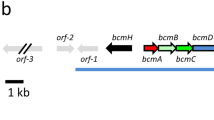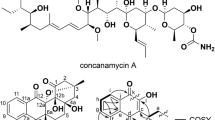Abstract
We have isolated bacillus strains highly productive for penicillin acylase using conventional mutagenesis and screening techniques. This report describes the isolation of a 2.7 kb chromosomal DNA fragment from Bacillus megaterium which, when inserted in a multi–copy vector and transferred into one of these highly productive strains, results in a further increase in productivity. This fragment did not direct the synthesis of active enzyme when transformed into Bacillus subtilis, which does not naturally produce penicillin acylase. This report also describes the cloning of a 6.2 kb B. megaterium DNA fragment containing at least five of the structural genes of the tryptophan biosynthesis pathway. All of these genes are expressed at a functional level in B. subtilis.
This is a preview of subscription content, access via your institution
Access options
Subscribe to this journal
Receive 12 print issues and online access
$209.00 per year
only $17.42 per issue
Buy this article
- Purchase on Springer Link
- Instant access to full article PDF
Prices may be subject to local taxes which are calculated during checkout
Similar content being viewed by others

References
Vandamme, E.J. and Voets, J.P. 1974. Microbial penicillin acylases. Advan. Appl. Microbiol. 17: 311–369.
Claridge, C.A., Gourevitch, A. and Lein, J. 1960. Bacterial penicillin amidase. Nature 187: 237–238.
Rolinson, G.N., Batchelor, F.R., Butterworth, D., Cameron-Wood, J., Cole, M., Eustace, G.C., Hart, M.V., Richards, M. and Chain, E.B. 1960. Formation of 6-aminopenicillanic acid from penicillin by enzymatic hydrolysis. Nature 187: 236–237.
Sakaguchi, K. and Murao, S. 1950. A preliminary report on a new enzyme penicillin amidase. J. Agr. Chem. Soc. Japan 23: 411.
Brown, B.J. and Carlton, B.C. 1980. Plasmid mediated transformation in Bacillus megaterium. J. Bact. 142: 508–512.
Lovett, P.S., Williams, D.M. and Duvall, E.J. 1982. Expression of a foreign procaryotic gene in Bacillus subtilis, p.51–59. In: Genetic Engineering of Microorganism for Chemicals. Hollaender, A., De-Moss, R.D., Kaplan, S., Konisky, J., Savage, D., and Wolfe, R.S. (eds.), Plenum Press, New York.
Szewczuk, A., Siewinski, M. and Snowinska, R. 1980. Colorimetric assay of penicillin amidase activity using phenylacetyl, aminobenzoic acid as substrate. Analy. Biochem. 103: 166–169.
Williams, D.M., Schoner, R.G., Duvall, E.J., Pries, L.H. and Lovett, P.S. 1981. Expression of E coli trp genes and the mouse dihydrofolate reductase gene cloned in Bacillus subtilis. Gene 16: 199–206.
Schoner, R.G., Williams, D.M. and Lovett, P.S. 1983. Enhanced expression of mouse dihydrofolate reductase in Bacillus subtilis. Gene 22: 47–57.
Keggins, K.M., Lovett, P.S. and Duvall, E.J. 1978. Molecular cloning of genetically active fragments of Bacillus DNA in Bacillus subtilis and properties of vector plasmid pUB110. Proc. Nat. Acad. Sci. (USA) 75: 1423–1427.
Author information
Authors and Affiliations
Rights and permissions
About this article
Cite this article
McCullough, J. Gene Cloning in Bacilli Related to Enhanced Penicillin Acylase Production. Nat Biotechnol 1, 879–882 (1983). https://doi.org/10.1038/nbt1283-879
Received:
Accepted:
Issue Date:
DOI: https://doi.org/10.1038/nbt1283-879
This article is cited by
-
Stability during fermentation of a recombinant α-amylase plasmid in Bacillus subtilis
Applied Microbiology and Biotechnology (1988)
-
Analysis of Resident and Transformant Plasmids in Bacillus Megaterium
Nature Biotechnology (1984)


